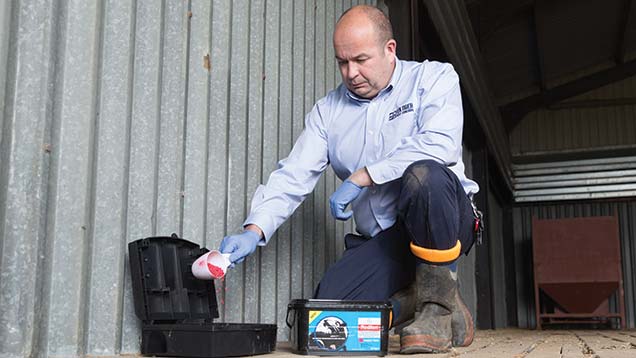New rules for rodenticides explained
 ©Tim Scrivener
©Tim Scrivener New rules for buying and using rodenticides means that farmers will now need a certificate of competence.
The new requirements will be phased in over the next 12 months and by June 2016 farmers will not be able to buy professional packs of rodenticide without the certificate.
See also: How to keep grain-spoiling rodents out of your store
Why the change has come about
The drive for better stewardship of rodenticides is aimed at professional pest controllers, gamekeepers and farmers and its use on farm that poses a significant risk.
Many farms deploy bait boxes in and around buildings 365 days a year to control rats and house mice, exposing non-target rodents such as field mice, which are then eaten by predators.
Dr Buckle explains that bait is often replaced as fast as it is eaten and this prophylactic approach is “questionable” at best.
“We need a change of mindset. It’s no longer acceptable for farmers to have harbourage for these pests around the yard – along with a permanent food source – and still deploy poison baits,” says Dr Buckle.
What the training will involve
It is hoped training and better awareness will lead to reductions in rodenticide residues in wildlife and this will be monitored closely in the coming years.
HSE demands a 30% drop of residue in barn owls over four years, but the start of that four-year period is yet to be confirmed.
Farmers who believe themselves to be competent already can take an online exam to gain certification, but classic classroom courses through training groups Lantra and City & Guilds are also available.
AHDB’s Katja Stoddart says it will also be launching an information hub on it website, which will provide a one-stop shop for information on rodent control on farm.
It aims to help farmers build the knowledge needed to gain the CRRU-accredited certificate needed to buy professional rodenticides.
“There should be at least one online exam option when the hub goes live in the coming weeks and farmers can also choose to do a classroom-based course. Details of both will be on the hub,” she adds.
A professional pest controller’s view
Michael Flatters, professional pest controller with Fen Tiger Pest Control, welcomes the move to improved training in rodent control measures for farmers.
He visits many farms and often sees bad practice that is breaking the law and risks farmers falling foul of crop assurance schemes such as Red Tractor.
“There needs to be more emphasis on proofing grain stores against rodents and I often make recommendations after a farm visit, but they rarely get done.
“Monitoring rodent activity is also crucial with monitor baits and traps, which need to be checked daily.
“You can move to poison baits if you need to, but traps can sometimes be enough on a tidy farm to keep rats at bay,” he adds.
Growers can use professional pest controllers to ensure they stay within the rules and Mr Flatters now offers a full audit and advisory service.
However, he says that if farmers want to carry out pest control themselves, they need to embed prevention measures and monitoring into their daily routine.
“Once you’ve moved to poison baits, there’s a recommendation that the bait shouldn’t be out for more than 35 days, so you need to get things under control quickly.
“Other sectors, such as professional controllers and gamekeepers are working hard to implement best practice and the same needs to happen on farm,” explains Mr Flatters.

